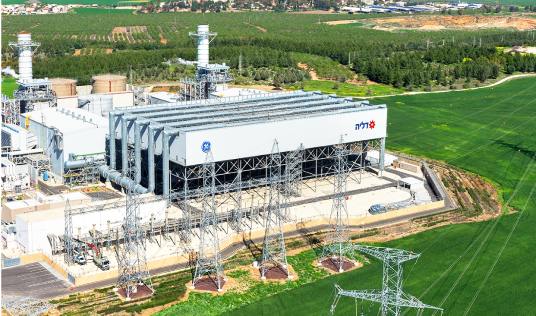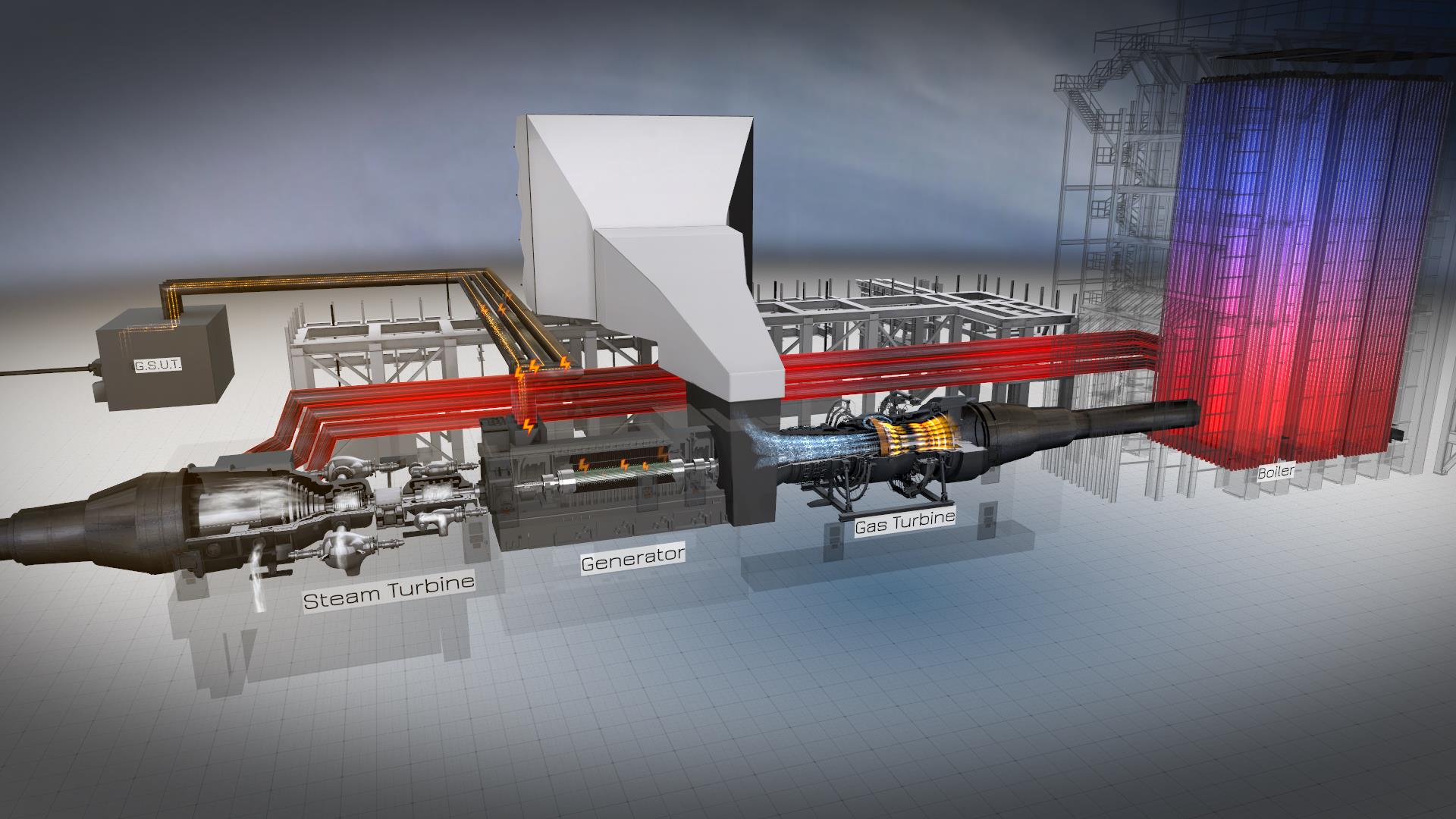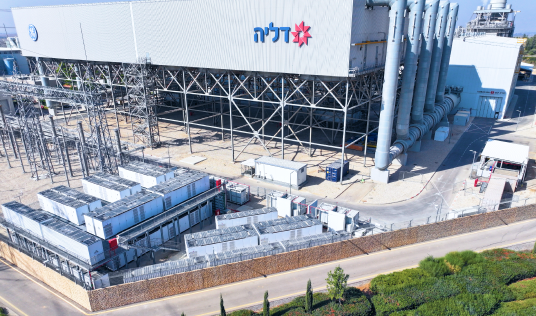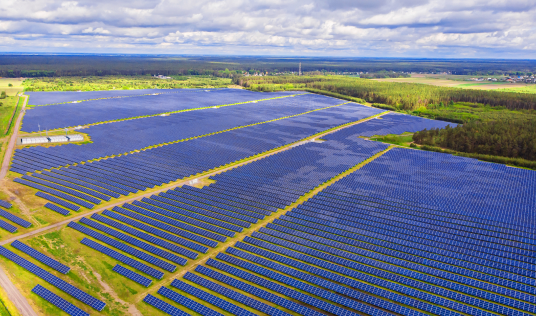 Built by GE -
Built by GE -
The first power plant was set up at the Tzafit site in the Judean Foothills. The construction was carried out by Alstom, a leading multinational company in the fields of energy and infrastructure, which later merged with the industrial giant GE – General Electric. In July 2015, the power plant commenced its commercial operation, and since then it has been producing electricity from natural gas and providing it to consumers across the country via IEC’s transmission system. This system is managed by Noga – an independent government company that manages the planning and development of the electricity system in Israel according to the local market needs.
In 2015, Dalia Power Energies received a production license to operate the station, as well as a license to sell electricity to its customers. ‘Dalia’ power plant produces approximately 900 MW using two efficient turbines, producing 450 MW each. The power plant operates using combined-cycle technology, which provides it with energy efficiency of 58% – the highest energy efficiency that is currently available in the Israeli electricity market.
The combined-cycle technology includes a gas turbine and a steam turbine. The gas turbine burns the natural gas and the hot exhaust gases are transferred from the gas turbine to a water boiler, turning the water in the boiler into steam, which in turn operates the steam turbine, which produces additional clean and efficient electricity.
The two turbines together produce about 900 MW, which are about 8% of the total electricity produced in the State of Israel. The electricity produced at the power plant is transmitted over the IEC’s transmission grid to consumers all over the country.
The use of natural gas significantly reduces greenhouse gas and other polluting emissions into the air in comparison to other fossil fuels, such as coal, diesel or fuel oil. We chose to use advanced energy production technology as part of our goal to lead a clean energy industry in Israel, and we are aligned with the world's leading countries in the field. The entire power generation process is carried out while preserving the environment and complying with all required standards.
Adjacent to the site are areas designated for the construction of another new station powered by natural gas, which was approved by the government with a capacity of 850 megawatts. A new large energy storage facility will be constructed next to the new power plant, to supply electricity to the national transmission grid, in order to support Israel's renewable energy goals for 2030.
The company's professional and administrative team works on site, and manages the planning and production of electricity generated by the station, along with all the other resources required for the production of energy in accordance with the changing needs of the electricity sector in Israel. Since operating the station requires a multi-disciplinary professional activity, this dedicated team also operates a large number of subcontractors from Israel and abroad, each of whom specializes in a unique engineering field
In 2024, Dalia Station received the internationally recognized ISO 14001 Environmental Management Systems (EMS) certificate, which signifies compliance with a system of procedures and work guidelines for the efficient management of an environmental system in an organization. Compliance with this standard is a significant component of Dalia's environmental strategy.
Why Dalia?
The Tzafit site was chosen by the National Infrastructure Committee out of four possible sites. In the beginning, the Committee decided that the station should be constructed in Mevo Carmel, near the mouth of the river Dalia, from which the company gets its name. Subsequently, the Committee changed its decision and the station was built in Tzafit, which is part of the Yoav Regional Council, but its original name was preserved.


In order to meet Israel’s renewable energy goals for 2030, Dalia is developing the field of energy storage both in facilities connected to the national transmission grid, and in facilities connected to the distribution network, as well as in its customers' yards.
In 2024, the first energy storage facility began operating on the Dalia Power Plant site. Based on lithium-ion technology developed by Sungrow, this state-of-the-art facility is unique of its kind with two floors and a storage capacity of 88 megawatts per hour.
The energy storage facility has two purposes:
Dalia is also promoting the establishment of a large energy storage facility in the Karmei Katif area, which will supply electricity to the transmission grid and the distribution network.
In addition, Dalia sets up small energy storage facilities in customers' yards, to help them optimize their business's electricity expenses, as well as to overcome the challenges of the local power grid, to stabilize the power frequency and to manage an independent and decentralized electricity grid.

In 2023, Dalia purchased the Eshkol power plant from the IEC, as part of the structural reform according to which the Israel Electric Corporation undertook to sell five power plants to the private sector.
The Eshkol power plant was purchased for a total of NIS 9 billion, and it is the largest plant in Israel powered by natural gas. The station operates two combine cycle turbines with a production capacity of 1606 megawatts. In addition, four old steam generating units are installed at the station, and are intended for scrapping within a few years.
The Eshkol site covers 440 dunams (110 acres) intended for significant development of the electricity sector, including the construction of the modern and efficient Eshkol 2 power plant – Avshal – with a production capacity of 850 megawatts, as well as large energy storage facilities.

Dalia allows its customers to enter into long-term agreements to purchase electricity produced from renewable energy sources combined with storage, throughout the entire day.
Our customers can consume electricity produced from renewable energy sources together with fossil (conventional) energy sources, and help improve environmental quality by reducing their carbon footprint.
In addition, Dalia issues EAC (Energy Attribute Certificate) certificates for its customers according to the IREC standard.
